Kilogram Introduction
One day, Joe’s dad learned that he was running out of some vegetables needed to prepare a special dish for their dinner guests. Busy with his chores in the kitchen, he handed a list of vegetables—potatoes, tomatoes, onions, carrots, and broccoli—to Joe.
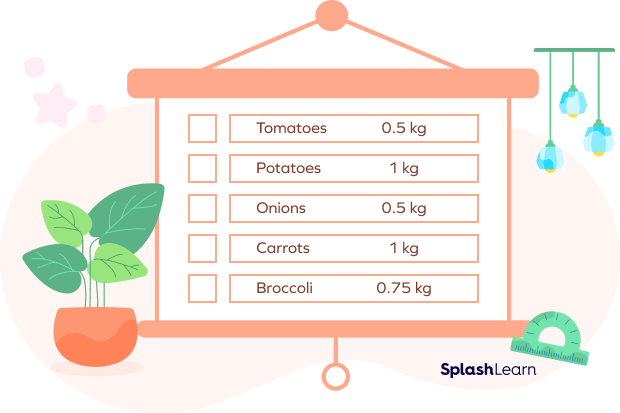
Little Joe is perplexed by looking at the numbers and the symbol “kg” (kilograms). Let’s help him buy the right amounts of vegetables by looking at the meaning of kilogram in math.
What Is Kg (Kilogram)?
Kilogram is the SI unit of mass that equals approximately 2.204 lbs.
Definition of Kilogram in Math
A kilogram is the standard unit of mass in the International System of Units. “Kilo” means thousand, and kilogram means a thousand grams. The symbol of the kilogram is “kg.”
Kilogram Measurement
From the definition, 1 kilogram measures 1000 grams. A kilogram is almost equal to the mass of 1000 cubic cm of water or 1 liter of water.
Kilograms Examples
Kilogram is omnipresent. From the shopping list written by Joe’s dad to the measurement of jet fuel used in an aircraft, and from our body weight to the rocket payload, you can find it everywhere.
“I’m a kilogram,
Cherished with a thousand grams!
Look around you—and you’ll find me everywhere,
From simple shopping stuff to a flight through the air!”
Example 1: 5 kgs of vegetables
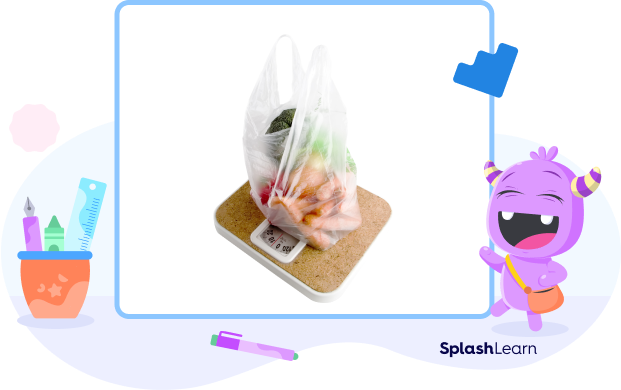
Example 2: Zanab weighs 50 kg.

Example 3: 1.5 kg butter
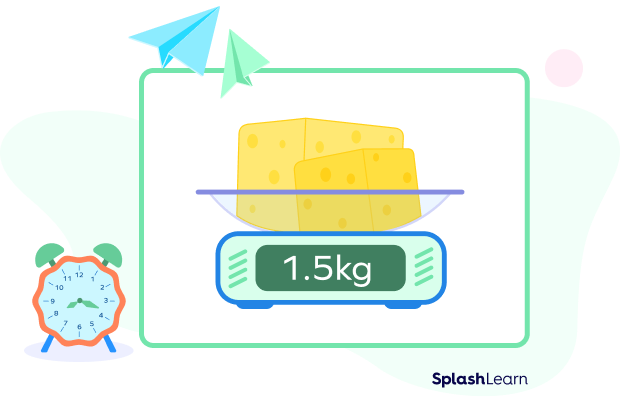
Example 4: 0.25 kg cake
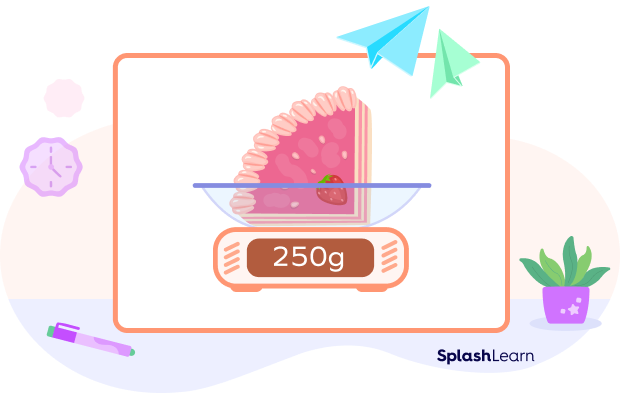
Example 5: 5 kg dumbbells

Kilogram Conversion
SI Prefixes
The base unit of mass in the metric system is the gram. All other units are named by adding a prefix to gram. For example, kilogram has the prefix “kilo”, which means 1000.
Similarly, we add prefixes to “gram” to obtain other units of measuring weight.
The below chart summarizes some common prefixes.
| Units | Relationship with a gram |
| Milligram (mg) | 0.001 g |
| Centigram (cg) | 0.01 g |
| Decigram (dg) | 0.1 g |
| Gram (g) | 1 g |
| Decagram (dcg) | 10 g |
| Hectogram (hg) | 100 g |
| Kilogram (kg) | 1,000 g |
Conversion Chart
SI Multiples (Prefixes) of Gram
We can use the below gram–kg chart to convert kilograms to SI prefixes of the gram.
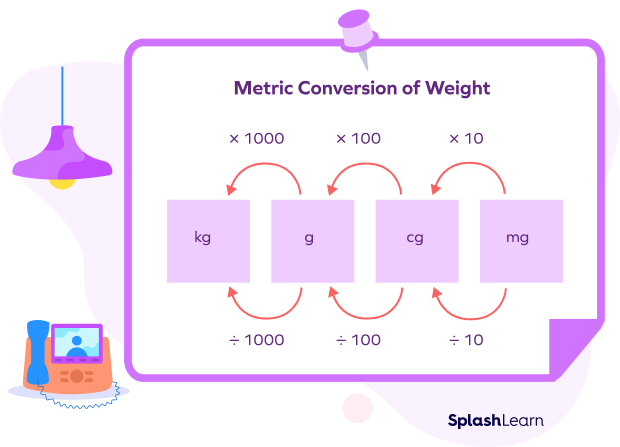
We can use this metric ladder to convert one metric unit to the other SI prefixes of the base unit.

The acronym below can easily help convert between different units of measurement.
In this case of measurement of weight, the base unit will be grams.

Conversion of Kilogram into SI Multiples of Gram
Kilogram to Gram
From the conversion table, 1 kg $= 1 \times 10 \times 10 \times 10$ g
$= 1000$ g.
So, 1 kg $= 1000$ g
Similarly, 1 g $= 1 \div (10 \times 10 \times 10)$ kg
$= 0.001$ kg.
So, 1 g $= 0.001$ kg.
Kilogram to Milligram
From the conversion table, 1 kg $= 1 \times 10 \times 10 \times 10 \times 10 \times 10 \times 10$ mg
$= 1,000,000$ mg
So, 1 kg $= 1,000,000$ mg.
Similarly, 1 mg $= 0.000001$ kg.
Conventional Units of Mass
The most common US customary units of mass are ounce, pound, and ton. The below conversion chart summarizes their relationship:
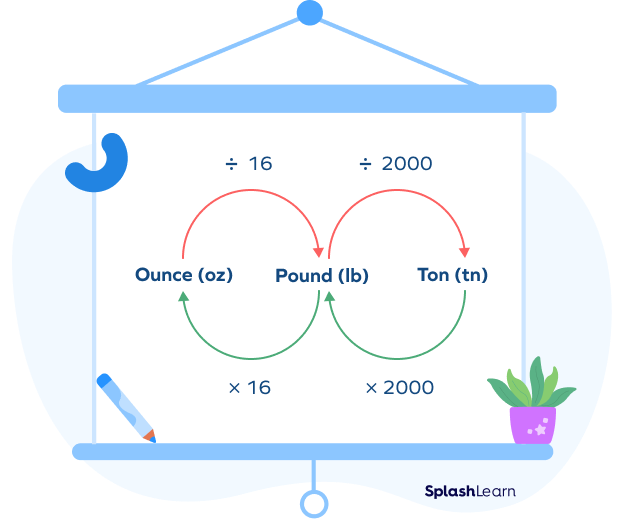
Conversion of Kilogram into US Customary Units
Kilogram to Ounce
1 kg $= 35.27$ oz
So, 1 oz $= 1 \div 35.27$ kg
$= 0.028$ kg
1 oz = 0.028 kg
Kilogram to Pound
From the conversion table, $35.27$ oz $= 35.27 \div 16$ lbs $= 2.204$ lbs
So, 1 kg $= 2.204$ lbs
Similarly, 1 lbs $= 0.45$ kg
Kilogram to Ton
From the conversion table, 2.204 lbs $= 2.204 \div 2,000$ US ton
$= 0.0011$ US ton
1 kg $= 0.0011$ US ton
Similarly, 1 US ton $= 907.18$ kg
Things that Weigh 1 Kilogram
Some things that weigh 1 kg are:
- A liter of water
- A 1 kg bag of sugar
- A 1 kg bag of rice
- A pineapple
- A cabbage
- A small laptop
Fun Facts
How much is a kilogram?
- In 1795, a kilogram was equivalent to a liter (or a cubic decimeter) of water.
- Later, a platinum standard (1799–1889) and a platinum-iridium standard (1889–2019) defined a kilogram.
- In 2019, the CGPM (General Conference on Weights and Measures) redefined kilogram in terms of Planck’s constant.
Colloquially, a kilogram is referred to as a “kilo.”
The US Congress legalized the use of “kilo” as an alternative to kilogram in 1866. However, it revoked the legal status of “kilo” in 1990.
The kilogram is the only SI base unit with a prefix.
Conclusion
Kilograms is the metric unit used to measure the weight of different objects. With the help of the exercises shared above, you can easily convert any unit of mass to kilograms and ace the concept of measuring weights conveniently.
Solved Examples
1. A giant tortoise weighs 550 pounds. Its weight in kg is:
Solution: We know that 1 lb $= 0.45$ kg
So, 550 lb $= 0.45 \times 550$
$= 247.5$ kg
2. Examine the below shopping list. Joe’s dad purchases the groceries and puts them in a carry bag. What will be the weight of the carry bag?
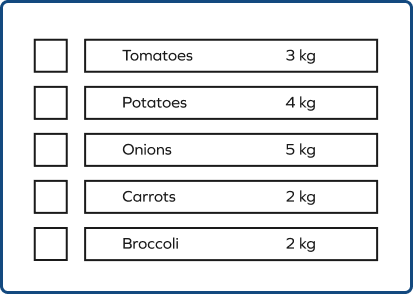
Solution: 16 kg
Total weight of the groceries = weight of the bag $= 3 + 4 + 5 + 2 + 2$ kg
$= 16$ kg
3. Joe bought a 1.2 kg cake. Tom, his friend, ate 400 g, and Jay, his cousin, ate 7.05 oz. How much cake is Joe left with?
Solution:
First, let’s convert all the given data into kg.
Tom ate 400 g cake. From the conversion table, 400 g $= 400 \div 1000$ kg
$= 0.4$ kg
Jay ate 7.05 oz of cake.
1 oz $= 0.028$ kg
So, $7.05$ oz $= 7.05 \times 0.028$ kg
$= 0.19$ kg
Total cake left with Joe $= 1.2 – (0.4 + 0.19)$
$= 1.2 – 0.59$
$= 0.61$ kg or $610$ g
4. Joe’s kitten, Chase, weighs 880 oz. Lily’s kitten, Skye, weighs 2000 dcg. And Tom’s kitten, Penny, weighs 23 kg. Whose kitten is the heaviest, i.e., weighs the most?
Solution: Let’s convert all the given data into kg.
Chase weighs 881.84 oz.
1 oz $= 0.028$ kg
So, $881.84$ oz $= 880 \times 0.028$ kg
$= 24.64$ kg
Skye weighs 2000 dcg.
According to the conversion chart, 1 dcg $= 10$g $= 0.01$ kg
$2,000$ dcg $= 2000 \div (10 \times 10)$ kg
$= 20$ kg
Penny weighs 23 kg.
Therefore, Chase, Joe’s kitten, weighs the most.
5. Arrange the following in descending order:
- 6 kg
- 8,000 g
- 2,000,000 mg
Solution: 8000 g, 6 kg, and 2,000,000 mg
First, let’s convert them to kg.
First = 6 kg . . . (1)
Second $= 8000$ g
We know 1 kg $= 1000$ g
So 1 g $= 1 \div 1000$ kg
$8,000$ g $= 8,000 \div 1000$ kg
$= 8$ kg . . . (2)
We know, 1 kg $= 1,000,000$ mg
Similarly, 1 mg $= 1 \div 1,000,000$ kg.
$2,000,000$ mg $= 2,000,000 \div 1,000,000$ kg
$= 2$ kg . . . (3)
So, the order will be 8 kg (2), 6 kg (1), and 2 kg (3)
Practice Problems
Kilogram in Math
A cow weighs 700 kg. Its weight in grams is:
We know that 1 kg $= 1000$ g
So, 700 kg $= 700 \times 1000$ g
$= 700,000$ g
A bunch of five apples weighs 1000 grams. Suppose all are of equal weight. If Joe eats three, the total weight of the remaining apples is:
Total weight of the apples $= 1000$ g
From the conversion table, 1000 g $= 1000 \div (10 \times 10 \times 10)$ kg
$= 1$ kg
All apples are of the same weight. So, the weight of one apple $= \frac{1}{5}$ kg
$= 0.2$ kg
Joe eats three. So remaining apples $= 2$
Weight of two apples $= 0.2 \times 2 = 0.4$ kg
Joe weighs 35 kg, Lily weighs 90 pounds, and Tom weighs 330,000 dg. Who weighs the most?
Lily’s weight $= 90$ pounds.
We know that 1 lbs $= 0.45$ kg
So, 90 lbs $= 90 \times 0.45$
$= 40.5$ kg
Tom’s weight $= 330,000$ dg
According to the conversion table, 330,000 dg $= 330,000 \div (10 \times 10 \times 10 \times 10)$ kg
$= 33$ kg
Joe weighs 35 kg.
Therefore, Lily weighs the most.
250 ants lift 1 mg of breadcrumbs each and take it to their anthill. The total weight of the collected bread crumbs is:
Total weight of the breadcrumbs lifted $= 250 \times 1$
$= 250$ mg
From the conversion table, $250 \div (10 \times 10 \times 10 \times 10 \times 10 \times 10)$
$= 0.00025$ kg
In Joe’s schoolbag, the books weigh 1 kg. Her tiffin weighs a pound, and she carries a 1l bottle. In addition, she carries a file weighing 200 grams. The total weight of her school bag is approximate:
Weight of Joe’s tiffin $= 1$ lb
$= 0.45$ kg.
Weight of her bottle $= 1$ l
$= 1$ kg
Weight of her file $= 200$ grams
$= 200 \div (10 \times 10 \times 10)$ [according to the conversion chart]
$= 0.2$ kg
Total weight of her schoolbag $= 0.45 + 1 + 0.2 + 1$
$= 2.65$ kg
Frequently Asked Questions
Which is bigger—half a kilogram or a pound?
One pound (1 lb) $=$ 0.45 kg. It is approximately 0.05 kg less than half a kilogram. Therefore, half a kilogram is bigger than a pound.
What are the units of kilogram?
The kilogram has no units. It itself is a unit of mass in the metric system. However, its symbol is “kg.”
Is a kilogram more than a ton?
No, a US ton is more than 900 times a kilogram.
Which is correct—“kg” or “kgs”?
Kg is the correct abbreviation of kilograms as “kgs” would mean kilogram seconds.
How many cubic meters is one kilogram?
One kilogram is equal to one liter. And one liter is 0.001 cubic meters. So, there are 0.001 cubic meters in one kilogram.
















